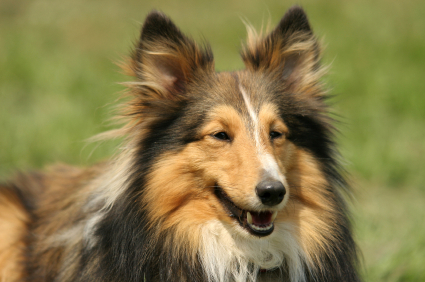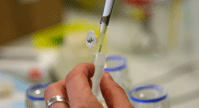Von Willebrand's Disease Type III
Description:
 Von Willebrand disease (vWD) is the most comon inherited bleeding disorder found in dogs and humans. vWD inhibits the normal blood clotting process, causing prolonged bleeding after an injury. People with this condition often experience excessive bruising, prolonged nosebleeds, and excessive bleeding following any form of trauma, including surgery or dental work.
Von Willebrand disease (vWD) is the most comon inherited bleeding disorder found in dogs and humans. vWD inhibits the normal blood clotting process, causing prolonged bleeding after an injury. People with this condition often experience excessive bruising, prolonged nosebleeds, and excessive bleeding following any form of trauma, including surgery or dental work.
The primary function of von Willebrand factor (vWF), a blood glycoprotein, is to bind itself to other proteins. The deficiency or failure of vWF function inhibits the blood coagulation process and causes bleeding. This is most apparent in tissues with high blood flow or narrow vessels.
Von Willebrand's Disease Type III (vWDIII) :
In dogs (as well as in people), three separate types of vWD have been identified. Of these three types there are five different genetic mutations causing vWDs in dogs. Genetic tests have been developed to identify all five variants. Von Willebrand's disease type III (VWDIII) is transmitted as an autosomal recessive trait and is the most serious of the three. vWDIII affected animals do not produce any von Willebrand Factor protein in their blood.
A different genetic mutation causes vWDIII in each of the following:
Type A Scottish Terrier
Type B Shetland Sheepdog
Type C Kooikerhondje
Acceptable Sample Types:
Animal Genetics accepts buccal swab, blood, and dewclaw samples for testing. Sample collection kits are available and can be ordered at Canine Test Now.
This Test Is Relevant For the Following Breeds:
Animal Genetics is currently only offering tests for von Willebrand's Disease Type III, Type II, and Type I. The Type III mutation has been detected in the following breeds:
- Scottish Terrier
- Shetland Sheepdog (Sheltie)
- Kooikerhondje
Results:
Animal Genetics offers DNA testing for von Willebrand's Disease type III. The genetic test verifies the presence of the vWD mutation and presents results as one of the following:
| vWDIII/vWDIII | Affected | The dog carries two copies of the mutant gene and is homozygous for the mutation associated with von Willebrand's disease type III. The dog IS affected and will always pass a copy of the mutation to its offspring. |
| vWDIII/n | Carrier | Both the normal and mutant copies of the gene detected. Dog is a carrier for the von Willebrand's disease type III mutation. The dog is NOT affected but will pass on a copy of the defective gene to its offspring 50% of the time. |
| n/n | Clear | Dog tested negative for the von Willebrand's Disease type III mutation and will not pass on the defective gene to its offspring. |
Reference:
Thromb Haemost. 1998 Aug;80(2):332-7.
Identification of mutations in the canine von Willebrand factor gene associated with type III von Willebrand disease. Rieger M1, Schwarz HP, Turecek PL, Dorner F, van Mourik JA, Mannhalter C.
Submit a Sample for Testing:
To submit a sample for testing please go to Canine Test Now.
To order a sample collection kit please go to order sample collection kits.
Cost per sample is $45.00. Please see our Canine Fee Schedule for all test rates.










